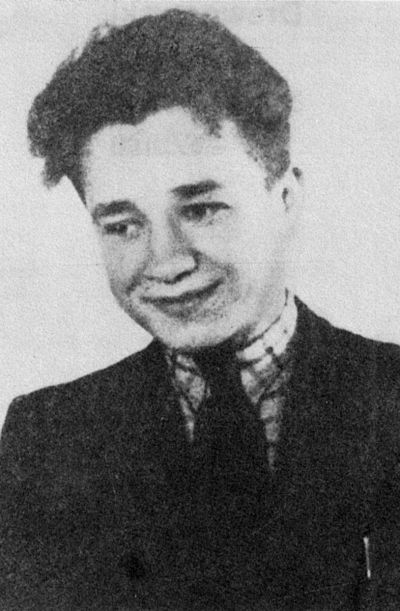“I was in a concentration camp”: Zbigniew Muszyński

After his return to Celle he joined the Polish army operating at the U.S. Army base in Mannheim Kaefertal. The commander was his colleague from Buchenwald Capt. Cuber. He completed several courses of military studies and commanded a Polish guard platoon operating with the U.S. Army. Among other things, he commanded a platoon of sentries, who led a column of German prisoners to the Dachau camp. A year earlier, as a prisoner in Dachau, he dreamed that he had wings and flew out over the gate from the camp, and, then that he led a column of German prisoners into the camp, passing through the gates of Dachau.
Colleagues woke him, because he was screaming and he told them what he dreamed. This dream came true.
Zbigniew decided to study. He paid his cigarette allocation to German professors to teach him mathematics and physics, he learnt about integrals and differentials. In August 1945 a letter came to his company saying that, anyone who had a high school diploma, could start studying at the Polish Academy of Technology in Esslingen Neckar. As he didn’t have diploma, he decided to pass the entrance examination. He passed an examination in Stuttgart (where he was the only candidate) with a very good result. He worked at the Polish Guards Company in Ludwigsburg and began studying. Every day he commuted by train from Ludwigsburg to Esslingen and back to work in the office of PGC. He studied three years while serving in the Guards company. In Ludwigsburg he met one of the Dubiel brothers, who returned to Poland and informed Zbigniew’s mother that he was alive.
When he served in the Guards Company in Ludwigsburg, four companies guarded several thousand German prisoners. They had about 60 machine guns. One day an American captain came and asked for an allocation of five German prisoners to work on a cleaning job. One of his sentries took the five prisoners to the city to work. In the crowd, the whole five fled. They all returned with food baskets in the evening.
Zbigniew was so pleased that he did not have to report the escape that he let the prisoners keep food. If Zbigniew had escaped the year before, he would certainly not be alive. The Germans would not have had any qualms in shooting him.
As the security guard at Ludwigsburg, he drove the German prisoners to the Nuremberg trials and interviews.
Zbigniew believes that his life he is watched over by St. Josaphat Kuncewicz, his ancestor. Born in Włodzimierz Wołyński (Vladimir Volynsky), he was murdered in 1623 years because of his faith. Beatified in 1643 by Pope Urban VIII, he was canonized in 1867 by Pope Pius IX. Since 1949 his relics have laid in the Basilica of St. Peter in the Vatican next to St. John. As five-year-old, Zbigniew dreamed about a saint playing with him. He remembered the image of this person. In 1949, when the relics of Saint Josaphat were moved to the Vatican, and the family found by the Red Cross, they sent him an image of St. Josaphat. Zbigniew recognized him as the 'Jezus who came to him in his sleep ' when he was five years old. He told his mother about his dream at that time.
Zbigniew emigrated to Australia in 1948. Here he had to work for two years clearing the forest and, then as a railwayman on the Perth-Geraldton route. For five years he worked in Narrogin as a dental technician in Dr. Marian Brzeziński’s office. Afterwards, he worked in Perth in the McGibbon dental office. One of his employers was L. Trotter, a pilot in the war, who flew over Warsaw dropping supplies for the Polish Home Army during the Warsaw Uprising.
Zbigniew's passion was horses. He bred and trained them. His best horse won races in Australia and America. While in Australia, he met priest Gajkowski, a colleague from Dachau.
Zbigniew married a beautiful Polish girl, Zofia, Miss Polonia, in Perth where they live happy and prosperous lives to this day. Zofia (Sophie), also comes from the east of Poland (before 1939). Today, these parts of Poland are in the Ukraine and Belarus. She and her family were deported by the Soviets to Siberia. She was lucky to come out of Siberia with Gen. Anders’s The Polish II Corps in 1943. In 1950 she was accepted by Australia from camps in Africa set up for families of Polish soldiers fighting with the English army at Monte Casino, Tobruk etc.
After the fall of communism in Poland, in April 1995, Zbigniew Muszyński was awarded The Auschwitz Cross, the Cross of the Polish Home Army and the Warsaw Uprising Cross, and, in March 1999 he was awarded the Medal of the Warsaw 1939-1945 and the Partisan Cross.
In February 2002, Zbigniew was promoted to a second lieutenant and in March 2004 to lieutenant of the Polish Army.
Discussions led by: Urszula Celińska-Mysław and Anna Lilpop
Written by Anna Lilpop
April 2017 – November 2018















